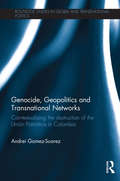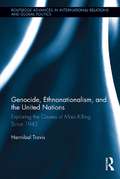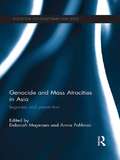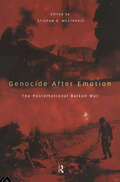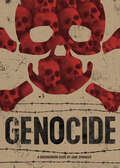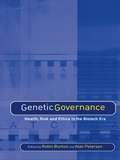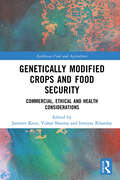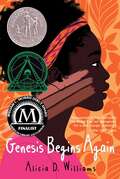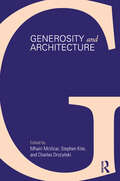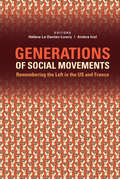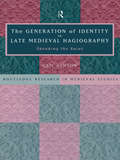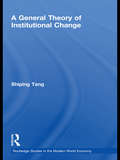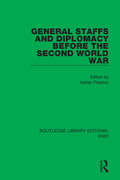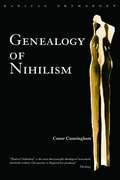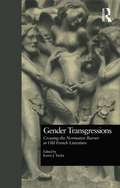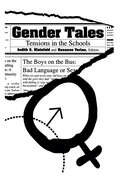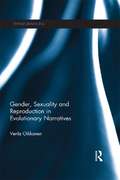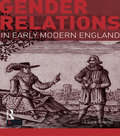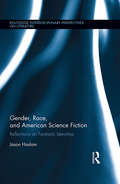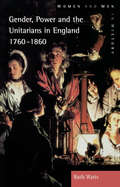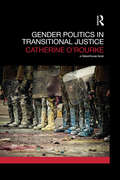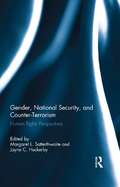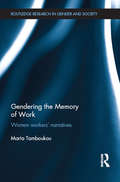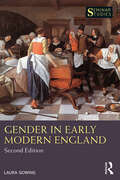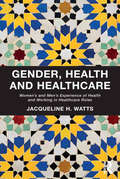Special Collections
Benetech’s Global Certified Accessible Titles
Description: Benetech’s GCA program is the first independent third-party EPUB certification to verify ebook accessibility. By creating content that is born accessible, publishers can meet the needs of all readers. Learn more: https://bornaccessible.benetech.org/
- Table View
- List View
Genocide, Geopolitics and Transnational Networks
by Andrei Gomez-SuarezThis volume seeks to uncover and discuss the links between genocide, geopolitics and transnational networks. By studying the destruction of the Union Patrotica (UP) in Colombia - a process usually regarded as one of the extreme by-products of the Colombian armed conflict- through the lens of genocide studies, Gomez-Suarez challenges mainstream international relations, genocide and Colombian armed conflict studies. Moving beyond the analysis of the Colombian case, the book offers a broader interdisciplinary theoretical framework that also attends to transnational relations of perpetrators and resisters and the political economy of affective-dispositions for mapping genocidal conjuncture. Methodologically, the text aims to present a re-interpretation of what constitutes genocide beyond its legal definition and turn towards its political and ethical dimensions to create a conceptual framework in which genocide appears to turn ever more into a decentralized network of various actors that contributed to a genocidal mentality, which, ultimately, enable the destruction of the civil society networks. This work will be an important contribution to both the debates on genocide and international relations and the study of global connectivities.
Genocide, Ethnonationalism, and the United Nations
by Hannibal TravisGenocide, Ethnonationalism, and the United Nations examines a series of related crises in human civilization growing out of conflicts between powerful states or empires and indigenous or stateless peoples. This is the first book to attempt to explore the causes of genocide and other mass killing by a detailed exploration of UN archives covering the period spanning from 1945 through 2011. Hannibal Travis argues that large states and empires disproportionately committed or facilitated genocide and other mass killings between 1945 and 2011. His research incorporates data concerning factors linked to the scale of mass killing, and recent findings in human rights, political science, and legal theory. Turning to potential solutions, he argues that the concept of genocide imagines a future system of global governance under which the nation-state itself is made subject to law. The United Nations, however, has deflected the possibility of such a cosmopolitical law. It selectively condemns genocide and has established an institutional structure that denies most peoples subjected to genocide of a realistic possibility of global justice, lacks a robust international criminal tribunal or UN army, and even encourages "security" cooperation among states that have proven to be destructive of peoples in the past. Questions raised include: What have been the causes of mass killing during the period since the United Nations Charter entered into force in 1945? How does mass killing spread across international borders, and what is the role of resource wealth, the arms trade, and external interference in this process? Have the United Nations or the International Criminal Court faced up to the problem of genocide and other forms of mass killing, as is their mandate?
Genocide and Mass Atrocities in Asia
by Deborah Mayersen and Annie PohlmanThe twentieth century has been labelled the ‘century of genocide’, and according to estimates, more than 250 million civilians were victims of genocide and mass atrocities during this period. This book provides one of the first regional perspectives on mass atrocities in Asia, by exploring the issue through two central themes. Bringing together experts in genocide studies and area specialists, the book looks at the legacy of past genocides and mass atrocities, with case studies on East Timor, Cambodia and Indonesia. It explores the enduring legacies of trauma and societal divisions, the complex and continuing impacts of past mass violence, and the role of transitional justice in the aftermath of mass atrocities in Asia. Understanding these complex legacies is crucial for the region to build a future that acknowledges the past. The book goes on to consider the prospects and challenges for preventing future mass atrocities in Asia, and globally. It discusses both regional and global factors that may impact on preventing future mass atrocities in Asia, and highlights the value of a regional perspective in mass atrocity prevention. Providing a detailed examination of genocide and mass atrocities through the themes of legacies and prevention, the book is an important contribution to Asian Studies and Security Studies.
Genocide after Emotion
by Stjepan G. MeštrovićThe failure to adequately respond on the part of the major Western superpowers to the atrocities in the Balkans constitutes a major moral and political scandal. In Genocide after Emotion Mestrovic and the contributors thoroughly interrogate the war, its media coverage and response in the West. The result is alarming, both for the progress of the war and for the condition of our society today: the authors argue that the West is suffering from a "postemotional" condition - we are beyond caring about anything anymore.
Genocide
by Jane SpringerWhat is genocide? Why does it happen, and what can be done to prevent it from happening again? These urgent questions are clearly and concisely explored for young adult readers. Some view the systematic killing, rape and destruction of homes in Darfur as a grave humanitarian crisis. For others, it’s a clear example of the ultimate crime against humanity — genocide. Who is right? What is genocide? What is the impact on humanity of wiping out entire groups of people? Who are the endangered human beings in today’s world? This thoughtful book helps young readers understand these and other difficult questions. Providing an overview of the history of genocide worldwide, the book explores the paradox that while a person who murders another person can be tried and even executed for the crime, a person who murders hundreds or thousands of people usually goes free. Using case studies the book points out their unique character while at the same time establishing important links between them. Most important, the book answers the question, what can be done to prevent genocide from happening in the future? "[The Groundwork Guides] are excellent books, mandatory for school libraries and the increasing body of young people prepared to take ownership of the situations and problems previous generations have left them." — Globe and Mail Correlates to the Common Core State Standards in English Language Arts: CCSS.ELA-LITERACY.RI.6.1 Cite textual evidence to support analysis of what the text says explicitly as well as inferences drawn from the text. CCSS.ELA-LITERACY.RI.6.2 Determine a central idea of a text and how it is conveyed through particular details; provide a summary of the text distinct from personal opinions or judgments. CCSS.ELA-LITERACY.RI.6.3 Analyze in detail how a key individual, event, or idea is introduced, illustrated, and elaborated in a text (e.g., through examples or anecdotes). CCSS.ELA-LITERACY.RI.6.6 Determine an author's point of view or purpose in a text and explain how it is conveyed in the text.
Genetic Governance
by Alan Petersen and Robin BuntonEthical and practical issues around genetic research are of major international concern, both in academia and in the public domain. Questions concerning what interventions are possible and appropriate with the increasing amount of genetic information available, challenge our understandings of ourselves, our health and wellbeing, and the role of medical ethics, public health, surveillance and risk. However there has been little reflection on the socio-political effects of this new genetic knowledge and the changes in practice that are currently impacting on our lives.Containing contributions from key international researchers, this book examines the broader issues of genetic debates and looks at how prediction and risk assessment is being changed in the arenas of health, medicine and reproduction, bringing new insight on the dangers of surveillance, regulation and increased inequality. Developed out of the Taylor and Francis journal Critical Public Health, the book considers the implications of developments in genetics for contemporary liberal governance, as well as for the future of healthcare and public health.
Genetically Modified Crops and Food Security
by Vishal Sharma and Jasmeet Kour and Imtiyaz KhandayThis book reviews a wide-range of genetically modified (GM) crops to understand how they are produced, the impacts on the agricultural industry, and their potential for improving food security. The production of GM crops has now become an invaluable asset in the agricultural toolbox. With a significant portion of the world suffering from hunger and poverty, this book examines how food security can be achieved through GM crops. A wide variety of crops are examined, from the earliest developments of GM tomatoes and potatoes to recent interest in the development of low-cost, high yielding biofuels, such as microalgae. Chapters also discuss the role of GM crops in pest management and the consequential reduction in the use of insecticides. Overall, this book provides an important synthesis of GM crops from their commercial value to the agricultural industry, as well as their potential for improving food security. This book will be of great interest to students and scholars of agricultural engineering, crop science, food biotechology, food security, and those interested in food and agriculture and sustainable development more broadly.
Genesis Begins Again
by Alicia WilliamsThis deeply sensitive and powerful debut novel tells the story of a thirteen-year-old who must overcome internalized racism and a verbally abusive family to finally learn to love herself.
There are ninety-six things Genesis hates about herself. She knows the exact number because she keeps a list. Like #95: Because her skin is so dark, people call her charcoal and eggplant—even her own family. And #61: Because her family is always being put out of their house, belongings laid out on the sidewalk for the world to see.
When your dad is a gambling addict and loses the rent money every month, eviction is a regular occurrence. What’s not so regular is that this time they all don’t have a place to crash, so Genesis and her mom have to stay with her grandma.
It’s not that Genesis doesn’t like her grandma, but she and Mom always fight—Grandma haranguing Mom to leave Dad, that she should have gone back to school, that if she’d married a lighter skinned man none of this would be happening, and on and on and on.
But things aren’t all bad. Genesis actually likes her new school; she’s made a couple friends, her choir teacher says she has real talent, and she even encourages Genesis to join the talent show.
But how can Genesis believe anything her teacher says when her dad tells her the exact opposite? How can she stand up in front of all those people with her dark, dark skin knowing even her own family thinks lesser of her because of it? Why, why, why won’t the lemon or yogurt or fancy creams lighten her skin like they’re supposed to? And when Genesis reaches #100 on the list of things she hates about herself, will she continue on, or can she find the strength to begin again?
Generosity and Architecture
by Mhairi McVicar, Stephen Kite, and Charles DrożyńskiThis book proposes that architecture can function as a true embodiment of generosity and examines how generosity in architecture operates within, and questions, current and historical socio-economic and political systems. As such, it interrogates ways in which architecture aspires for something more, whether within economic austerities or within historic contexts of a discipline that has often been preoccupied with cost and quantitative measurement. The texts presented in this book critically examine the theme of generosity and architecture from a variety of perspectives, addressing the theoretical, the historical, and the everyday processes of architectural practice, procurement, and policy in a global context. The book is a richly collaborative text which explores how architecture – in its processes of ordering and shaping space – can represent and embody generosity in all its multi-faceted potential.
Generations of Social Movements
by Helene Le Dantec-Lowry and Ambre IvolFrench political culture has long been seen as a model of leftist militancy, while the left in the United States is often perceived in terms of organizational discontinuity. Yet, the crisis of social democracy today suggests that at a time when the archetypal European welfare state is in danger, critics and citizens interested in understanding or reviving progressive politics are invited to consider the United States, where modes of creative activism recurrently demonstrate potentialities for a renewed leftist culture. Using a transatlantic perspective, this volume identifies activist influence through the designation or rejection of specific intellectual and militant figures across generations, and it examines various narrative modes used by militants to write their own history.
The Generation of Identity in Late Medieval Hagiography
by Gail Ashton and Gail Ashton NfaIn this interdisciplinary and boundary-breaking study, Gail Ashton examines the portrayals of women saints in a wide range of medieval texts. She deploys the French feminist critical theory of Cixous and Iriguray to illuminate these depictions of women by men and to further our understanding of both the lives and deeds of female saints and the contemporary, and almost always male, attitudes to them.
A General Theory of Institutional Change
by Shiping TangInstitutional change is a central driving force behind social changes, and thus a central topic in all major fields of social sciences. Yet, no general theory of institutional change exists. Drawing from a diverse literature, this book develops a general theory of institutional change, based on a social evolutionary synthesis of the conflict approach and the harmony approach. The book argues that because the whole process of institutional change can be understood as a process of selecting a few ideas and turning them into institutions, competition of ideas and struggle for power to make rules are often at the heart of institutional change. The general theory not only integrates more specific theories and insights on institutional change that have been scattered in different fields into a coherent general theory but also provides fundamental new insights and points to new directions for future research. This book makes a fundamental contribution to all major fields of social sciences: sociology (sociological theory), political sciences, institutional economics, and political theory. It should be of general interest to scholars and students in all major fields of social science.
General Staffs and Diplomacy before the Second World War
by Adrian PrestonThis book, first published in 1978, examines the influence of the General Staffs upon the diplomacy of appeasement and rearmament between 1931 and 1941. The great question of European security and order, and their breakdown and the outbreak of the second world war, are examined here through the eyes of Cabinets and Foreign Offices as well as through the eyes of Chiefs of Staff.
Genealogy of Nihilism
by Conor CunninghamThis text re-reads Western history in the light of nihilistic logic, which pervades two millennia of Western thought. From Parmenides to Alain Badiou, via Plotinus, Avicenna, Duns Scotus, Ockham, Descartes, Spinoza, Kant, Hegel, Heidegger, Sartre, Lacan, Deleuze and Derrida, a genealogy of nothingness can be witnessed in development, with devastating consequences for the way we live.
Gender Transgressions
by Karen J. TaylorFirst published in 1998. Routledge is an imprint of Taylor & Francis, an informa company.
Gender Tales
by Judith S. Kleinfeld and Suzanne YerianA book of "real world" cases, this text introduces "flashpoint" issues related to gender equity in the schools. It immerses readers in the human dilemmas teachers face when they set out to provide equal opportunities for -- and to develop the abilities of -- all of their students. Each case, a true but disguised situation, presents the pedagogical concerns, ethical questions, competing values, and complexity of social change teachers face on a daily basis in their classrooms. These cases help readers to identify and understand ideas and issues by relating them to both their own and others' real-life experiences. The book includes activities and discussion questions to involve readers in critical thinking about the issues raised in the cases and in applying this knowledge to their own current or future classroom practice. Using a casebook approach, the text is organized in five sections. Designed to help readers explore the issues raised by contextualizing them in stories that are authentic and engaging, it emphasizes the teacher's role as a skilled professional who thinks critically and makes decisions, and creates lively and involved class discussion by making room for students with diverse perspectives.
Gender, Sexuality and Reproduction in Evolutionary Narratives
by Venla OikkonenSince the early 1990s, evolutionary psychology has produced widely popular visions of modern men and women as driven by their prehistoric genes. In Gender, Sexuality and Reproduction in Evolutionary Narratives, Venla Oikkonen explores the rhetorical appeal of evolutionary psychology by viewing it as part of the Darwinian narrative tradition. Refusing to start from the position of dismissing evolutionary psychology as reactionary or scientifically invalid, the book examines evolutionary psychologists’ investments in such contested concepts as teleology and variation. The book traces the emergence of evolutionary psychological narratives of gender, sexuality and reproduction, encompassing: Charles Darwin’s understanding of transformation and sexual difference Edward O. Wilson’s evolutionary mythology and the evolution-creationism controversy Richard Dawkins’ molecular agency and new imaging technologies the connections between adultery, infertility and homosexuality in adaptationist thought. Through popular, literary and scientific texts, the book identifies both the imaginative potential and the structural weaknesses in evolutionary narratives, opening them up for feminist and queer revision. This book will be of interest to students and scholars of the humanities and social sciences, particularly in gender studies, cultural studies, literature, sexualities, and science and technology studies.
Gender Relations in Early Modern England
by Laura GowingThis concise and accessible book explores the history of gender in England between 1500 and 1700. Amidst the political and religious disruptions of the Reformation and the Civil War, sexual difference and gender were matters of public debate and private contention. Laura Gowing provides unique insight into gender relations in a time of flux, through sources ranging from the women who tried to vote in Ipswich in 1640, to the dreams of Archbishop Laud and a grandmother describing the first time her grandson wore breeches. Examining gender relations in the contexts of the body, the house, the neighbourhood and the political world, this comprehensive study analyses the tides of change and the power of custom in a pre-modern world. This book offers: Previously unpublished documents by women and men from all levels of society, ranging from private letters to court cases A critical examination of a new field, reflecting original research and the most recent scholarship In-depth analysis of historical evidence, allowing the reader to reconstruct the hidden histories of women Also including a chronology, who’s who of key figures, guide to further reading and a full-colour plate section, Gender Relations in Early Modern England is ideal for students and interested readers at all levels, providing a diverse range of primary sources and the tools to unlock them.
Gender, Race, and American Science Fiction
by Jason HaslamThis book focuses on the interplay of gender, race, and their representation in American science fiction, from the nineteenth-century through to the twenty-first, and across a number of forms including literature and film. Haslam explores the reasons why SF provides such a rich medium for both the preservation of and challenges to dominant mythologies of gender and race. Defining SF linguistically and culturally, the study argues that this mode is not only able to illuminate the cultural and social histories of gender and race, but so too can it intervene in those histories, and highlight the ruptures present within them. The volume moves between material history and the linguistic nature of SF fantasies, from the specifics of race and gender at different points in American history to larger analyses of the socio-cultural functions of such identity categories. SF has already become central to discussions of humanity in the global capitalist age, and is increasingly the focus of feminist and critical race studies; in combining these earlier approaches, this book goes further, to demonstrate why SF must become central to our discussions of identity writ large, of the possibilities and failings of the human —past, present, and future. Focusing on the interplay of whiteness and its various 'others' in relation to competing gender constructs, chapters analyze works by Nathaniel Hawthorne, Mary E. Bradley Lane, Edgar Rice Burroughs, Philip Francis Nowlan, George S. Schuyler and the Wachowskis, Frank Herbert, William Gibson, and Octavia Butler. Academics and students interested in the study of Science Fiction, American literature and culture, and Whiteness Studies, as well as those engaged in critical gender and race studies, will find this volume invaluable.
Gender, Power and the Unitarians in England, 1760-1860
by Ruth WattsThis new study explores the role the Unitarians played in female emancipation. Many leading figures of the late eighteenth and early nineteenth centuries were Unitarian, or were heavily influenced by Unitarian ideas, including: Mary Wollstonecraft, Elizabeth Gaskell, George Eliot, and Florence Nightingale. Ruth Watts examines how far they were successful in challenging the ideas and social conventions affecting women. In the process she reveals the complex relationship between religion, gender, class and education and her study will be essential reading for those studying the origins of the feminist movement, nineteenth-century gender history, religious history or the history of education.
Gender Politics in Transitional Justice
by Catherine O'RourkeWhat role do transitional justice processes play in determining the gender outcomes of transitions from conflict and authoritarianism? What is the impact of transitional justice processes on the human rights of women in states emerging from political violence? Gender Politics in Transitional Justice argues that human rights outcomes for women are determined in the space between international law and local gender politics. The book draws on feminist political science to reveal the key gender dynamics that shape the strategies of local women’s movements in their engagement with transitional justice, and the ultimate success of those strategies, termed ‘the local fit’. Also drawing on feminist doctrinal scholarship in international law, ‘the international frame’ examines the role of international law in defining harms against women in transitional justice and in determining the ‘from’ and ‘to’ of transitions from conflict and authoritarianism. This book locates evolving state practice in gender and transitional justice over the past two decades within the context of the enhanced protection of women’s human rights under international law. Relying on original empirical and legal research in Chile, Northern Ireland and Colombia, the book speaks more broadly to the study of gender politics and international law in transitional justice.
Gender, National Security, and Counter-Terrorism
by Margaret L. Satterthwaite and Jayne C. HuckerbyIn the name of fighting terrorism, countries have been invaded; wars have been waged; people have been detained, rendered and tortured; and campaigns for "hearts and minds" have been unleashed. Human rights analyses of the counter-terrorism measures implemented in the aftermath of 11 September 2001 have assumed that men suffer the most—both numerically and in terms of the nature of rights violations endured. This assumption has obscured the ways that women, men, and sexual minorities experience counter-terrorism. By integrating gender into a human rights analysis of counter-terrorism—and human rights into a gendered analysis of counter-terrorism—this volume aims to reverse this trend. Through this variegated human rights lens, the authors in this volume identify the spectrum and nature of rights violations arising in the context of gendered counter-terrorism and national security practices. Introduced with a foreword by Martin Scheinin, former UN Special Rapporteur on Human Rights and Counter-Terrorism, the volume examines a wide range of gendered impacts of counter-terrorism measures that have not been theorized in the leading texts on terrorism, counter-terrorism, national security, and human rights. Gender, National Security and Counter-Terrorism will be of particular interest to scholars and students in the disciplines of Law, Security Studies and Gender Studies.
Gendering the Memory of Work
by Maria TamboukouThis book explores gendered aspects in the memory of work by looking at auto/biographical narratives and political writings of women workers in the garment industry. The author draws on cutting edge theoretical approaches and insights in memory studies, neo-materialism and discourse analysis, particularly looking at entanglements and intra-actions between places, bodies and objects. Tamboukou aims to enrich our appreciation of the role of women’s labour history in the wider realm of cultural memory, as well as in the politics of women’s work. The book addresses a significant gap in the literature by focusing on the memory of work from a gendered perspective. It also examines the relationship between workspaces and personal spaces: the intimate, intense and often invisible ways through which workers occupy workspaces and populate them with their ideas, emotions, beliefs, habits and everyday practices. The book will be a theoretical and methodological toolbox for students and researchers in the interface of the social sciences and the humanities, as well as a vital resource in women’s labour history. It will be particularly relevant for sociologists, cultural theorists, feminist scholars and social historians.
Gender in Early Modern England
by Laura GowingThis concise and stimulating book explores the history of gender in England between 1500 and 1700. The second edition has been thoroughly revised to include new material on global connections, masculinity and recent historiography. Amid the upheavals of the Reformation and Civil Wars, gender was political. Sexual difference and women’s roles were matters of public debate, while social and economic changes were impacting on work, family and marriage. The rich archives of law, state and family testify to the complex configurations of patriarchal order and resistance to it. Gender in Early Modern England provides insight into gender relations in a time when a stark hierarchy of gender co-existed with a surprising degree of female capacity, great potential for challenge and confrontation, and a persistent sense of the mystery of the body. Documents include early feminist argument, law, midwives’ books, recipes, protest, sexual insults, cross-dressers, women escaping slavery, royal favourites and petitions. With a chronology, who’s who, glossary, guide to further reading and previously unpublished archival documents, Gender in Early Modern England is the perfect resource for all students interested in the history of women and gender in England between 1500 and 1700.
Gender, Health and Healthcare
by Jacqueline H. WattsHealth status and the experience of working in health care roles are both strongly shaped by gender and, although there have been attempts to incorporate ’gender awareness’ in both health and employment policies, the significance of gender in these areas continues to be marginalised within public debates and academic discourses. Taking a social constructionist perspective, Watts considers the ways in which gender impacts upon health in all its elements including access, technology, professionalisation, health promotion and health as an important sector of the labour market. She discusses gender as a developing and diversified category, exploring ideas about masculinity and the fluidity of gender boundaries in determining individual identity. Chapters that follow discuss men’s and women’s health; ideology of gender and health, specifically exploring different social norms and ideas about male and female health and the dominant ideological association between femaleness and caring; working for health with particular focus on the gendered interplay of caring and curing roles; technology and changes to gender, health and healthcare; health promotion as a gendered activity and, finally, the importance of introducing an intersectional approach beyond gender to articulate a deeper understanding of health in a postmodern context. The concluding chapter draws together these themes to underscore the importance of placing gender at the centre of health and health care delivery to fully take account of both the different life and health experiences of men and women and the gendered dimensions of working in health care.
